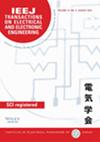Mukkoti Maruthi Venkata Chalapathi, K. Sreenivasulu, R. Jeya, Muhammad Faheem, R. Madana Mohana, Arfat Ahmad Khan, Kadiyala Ramana
下载PDF
{"title":"无人机技术智能环境中基于区块链的联邦学习方法","authors":"Mukkoti Maruthi Venkata Chalapathi, K. Sreenivasulu, R. Jeya, Muhammad Faheem, R. Madana Mohana, Arfat Ahmad Khan, Kadiyala Ramana","doi":"10.1002/tee.70025","DOIUrl":null,"url":null,"abstract":"<p>High-security transactions are stored in a chain of blocks using blockchain technology. Security and privacy concerns may be addressed by using blockchain technology. Federated learning is a paradigm for increasing data mining accuracy and precision by ensuring data privacy and security for both internet of things (IoT) devices and users in smart environments. Algorithms for dealing with limited training data and avoiding a particular model are included in the proposed model. Drones are indeed being researched and proactively employed in emergency situations, as well as catastrophic and high-casualty situations. Governance, security, flying circumstances, security and privacy, authorization, confidentiality, and specifics around the creation, maintenance, and operation of a medical drone network are now obstacles to extending their usage in emergency medicine and emergency medical service (EMS). In this paper, we present the more effective FL to protect the data privacy of drones, which involves doing local and global parameter updates for drones and exchanging training parameters concerning fog nodes, rather than sending drone raw data to the cloud. Even so, eavesdropping and analyzing parameters that are uploaded during the training procedure might still provide ground eavesdroppers with information on drone privacy and operations. Specifically, in this work, we examine how to optimize the power management strategies to optimize all the required parameters of FL security cost while being bound by battery usage of drone capacity and the necessity for quality of service (QoS) (i.e., required training time). Extensive simulations were conducted, and the results demonstrate that the proposed Secure Federated Power Control (SFPC) can effectively improve utilities for drones, promote high-quality model sharing, and ensure privacy protection in federated learning, compared with existing schemes. © 2025 The Author(s). <i>IEEJ Transactions on Electrical and Electronic Engineering</i> published by Institute of Electrical Engineers of Japan and Wiley Periodicals LLC.</p>","PeriodicalId":13435,"journal":{"name":"IEEJ Transactions on Electrical and Electronic Engineering","volume":"20 9","pages":"1393-1404"},"PeriodicalIF":1.1000,"publicationDate":"2025-04-05","publicationTypes":"Journal Article","fieldsOfStudy":null,"isOpenAccess":false,"openAccessPdf":"https://onlinelibrary.wiley.com/doi/epdf/10.1002/tee.70025","citationCount":"0","resultStr":"{\"title\":\"Blockchain-Based Federated Learning Methodologies in Smart Environments for Drone Technology\",\"authors\":\"Mukkoti Maruthi Venkata Chalapathi, K. Sreenivasulu, R. Jeya, Muhammad Faheem, R. Madana Mohana, Arfat Ahmad Khan, Kadiyala Ramana\",\"doi\":\"10.1002/tee.70025\",\"DOIUrl\":null,\"url\":null,\"abstract\":\"<p>High-security transactions are stored in a chain of blocks using blockchain technology. Security and privacy concerns may be addressed by using blockchain technology. Federated learning is a paradigm for increasing data mining accuracy and precision by ensuring data privacy and security for both internet of things (IoT) devices and users in smart environments. Algorithms for dealing with limited training data and avoiding a particular model are included in the proposed model. Drones are indeed being researched and proactively employed in emergency situations, as well as catastrophic and high-casualty situations. Governance, security, flying circumstances, security and privacy, authorization, confidentiality, and specifics around the creation, maintenance, and operation of a medical drone network are now obstacles to extending their usage in emergency medicine and emergency medical service (EMS). In this paper, we present the more effective FL to protect the data privacy of drones, which involves doing local and global parameter updates for drones and exchanging training parameters concerning fog nodes, rather than sending drone raw data to the cloud. Even so, eavesdropping and analyzing parameters that are uploaded during the training procedure might still provide ground eavesdroppers with information on drone privacy and operations. Specifically, in this work, we examine how to optimize the power management strategies to optimize all the required parameters of FL security cost while being bound by battery usage of drone capacity and the necessity for quality of service (QoS) (i.e., required training time). Extensive simulations were conducted, and the results demonstrate that the proposed Secure Federated Power Control (SFPC) can effectively improve utilities for drones, promote high-quality model sharing, and ensure privacy protection in federated learning, compared with existing schemes. © 2025 The Author(s). <i>IEEJ Transactions on Electrical and Electronic Engineering</i> published by Institute of Electrical Engineers of Japan and Wiley Periodicals LLC.</p>\",\"PeriodicalId\":13435,\"journal\":{\"name\":\"IEEJ Transactions on Electrical and Electronic Engineering\",\"volume\":\"20 9\",\"pages\":\"1393-1404\"},\"PeriodicalIF\":1.1000,\"publicationDate\":\"2025-04-05\",\"publicationTypes\":\"Journal Article\",\"fieldsOfStudy\":null,\"isOpenAccess\":false,\"openAccessPdf\":\"https://onlinelibrary.wiley.com/doi/epdf/10.1002/tee.70025\",\"citationCount\":\"0\",\"resultStr\":null,\"platform\":\"Semanticscholar\",\"paperid\":null,\"PeriodicalName\":\"IEEJ Transactions on Electrical and Electronic Engineering\",\"FirstCategoryId\":\"5\",\"ListUrlMain\":\"https://onlinelibrary.wiley.com/doi/10.1002/tee.70025\",\"RegionNum\":4,\"RegionCategory\":\"工程技术\",\"ArticlePicture\":[],\"TitleCN\":null,\"AbstractTextCN\":null,\"PMCID\":null,\"EPubDate\":\"\",\"PubModel\":\"\",\"JCR\":\"Q4\",\"JCRName\":\"ENGINEERING, ELECTRICAL & ELECTRONIC\",\"Score\":null,\"Total\":0}","platform":"Semanticscholar","paperid":null,"PeriodicalName":"IEEJ Transactions on Electrical and Electronic Engineering","FirstCategoryId":"5","ListUrlMain":"https://onlinelibrary.wiley.com/doi/10.1002/tee.70025","RegionNum":4,"RegionCategory":"工程技术","ArticlePicture":[],"TitleCN":null,"AbstractTextCN":null,"PMCID":null,"EPubDate":"","PubModel":"","JCR":"Q4","JCRName":"ENGINEERING, ELECTRICAL & ELECTRONIC","Score":null,"Total":0}
引用次数: 0
引用
批量引用


 求助内容:
求助内容: 应助结果提醒方式:
应助结果提醒方式:


